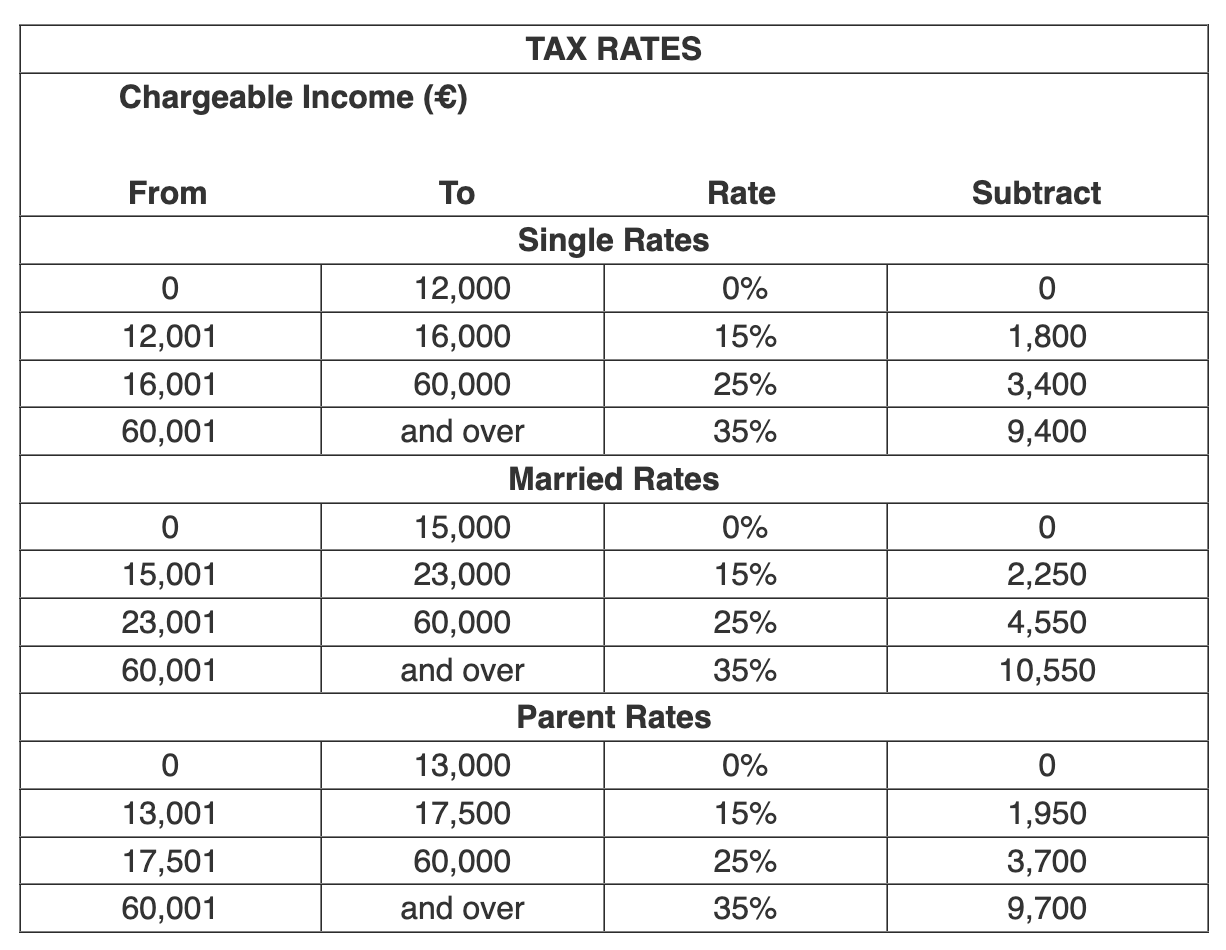Tax Guide for Maltese Expats: Sunny Paradise or Hidden Tax Trap?
Do you dream of sandy beaches and azure seas? Of a life under the Mediterranean sun? Malta not only attracts visitors with its breathtaking scenery, but also with a tempting tax system. But before you rush to pack your bags and head for the sun, it’s worth taking a look at the easy-to-understand Maltese tax law.
Malta’s simple tax types – short answer for quick readers
- All persons living in Malta must submit a tax return.
- Non-dom status and the tax flat rate of 5,000 euros.
- Citizens receive an inflation adjustment every quarter
- No capital gains tax
- Cryptocurrencies: Follow special regulations.
The Malta tax model decoded: Opportunities and risks for emigrants
Malta offers a unique tax model – but what does this mean for you as an expatriate? We decode the intricacies of the Maltese tax system and show you the opportunities and risks. Whether you are an employee, pensioner, crypto trader or digital nomad – find out how you can make the most of your tax situation in Malta.
Tax return in Malta – dates and deadlines
As in almost every country, there is an obligation in Malta to declare income annually in a tax return. This applies to entrepreneurs, the self-employed, private individuals, landlords, investors and pensioners resident in Malta.
The tax return for the previous year must be submitted by 30 June. It will be sent out by May and can also be completed online using the e-ID Card.
You have not received the ‘Income Tax Return’ form?
The flow of information between the authorities is not flawless. For example, documents are sometimes sent to the old address for years after a move if you do not contact them yourself. There are 3 options for clarification:
- Ask for reshipment by telephone or e-mail.
- Download the forms from the tax authorities.
- Submit your tax return online.
The Commission for Revenue is responsible for your Income Tax Return. The Commissioners for Tax & Custom are the departments in Il-Floriana on Malta and in Victoria on Gozo.

World of Malta insider tip: Proof of tax residency
In Malta, you apply to the Commissioner for Tax & Customs for the Certificate of Residence. This document confirms your tax residency in Malta and is required for double taxation agreements (DTAs) in order to avoid double taxation or to obtain a reduction or exemption from withholding tax on income from DTA countries.
Employees, digital nomads and freelancers in Malta: navigating the tax jungle
As an employee, digital nomad or entrepreneur, you are subject to a simple graduated scale of tax rates. No special software is required in Malta, as is the case for a German, French or Belgian tax return. The comparatively uncomplicated tax return comprises a maximum of four A4 pages.
Tax returns for entrepreneurs, freelancers and digital nomads must be submitted by 30 June of the following year at the latest. The same applies to employees, although there are sometimes different regulations. For employees, tax reconciliation takes place automatically between the employer and the tax authorities. After a few years, a ‘non-filer’ status is sometimes filed so that no more tax returns need to be submitted – provided there is no other taxable income.
For digital nomads with non-EU status, either 10% flat-rate tax or the tax of the home country applies in the first year. We inform you about the advantages of the 5 per cent tax model for limited companies in Malta. Find out more about setting up a limited company and the options for relocating a company to Malta.
Can employees register as ‘no filers’?
The tax authority decides on an individual basis whether an employee is granted non-filer status. The rules are not public. Some employees report that after submitting three tax returns in the fourth year, they no longer received any documents.
Tip: The quickest way to find out your status is to call the service number 153. A tax return can still be worthwhile – especially if you pay maintenance for your child or have changed employer.
When the state provides citizens with living expenses
In Malta, citizens have been receiving a COLA bonus (Cost of Living Allowance) for many years. This cost of living allowance is based on inflation and is paid out on a quarterly basis:
- 1st quarter: € 121.16
- 2nd quarter: € 135.10
- 3rd quarter: € 121.16
- 4th quarter: € 135.10
The amount is reduced proportionately for part-time employment. Important: The COLA allowance is taxable.
Exception: posting of employees from an EU country abroad
A posting is a temporary work stay in Malta for your employer. You will continue to be paid by your employer and remain subject to compulsory insurance in your posting country. The duration of a posting varies. Within the European Union and is limited to 24 months.
Don’t forget the certificate of posting (A1)
As an employee, self-employed person or civil servant, you need an A1 certificate if you work across borders in the European Union, Switzerland, Liechtenstein, Norway or Iceland. This certificate confirms that you are still insured under the law of your country.
Retirement Eldorado Malta? The tax truth behind retirement
Golden years under the Maltese sun – doesn’t that sound tempting? Over 1.7 million retirement pensions are transferred abroad from Germany. But Malta is not always an Eldorado for pensioners. Even if you only live off your savings, you have to submit a tax return. If you were not previously liable to pay tax as an employee or entrepreneur, apply for a tax number from the Commission for Revenue. If your global income is over 35,000 euros, the 5,000 euro tax flat rate with non-dom status is an option.
Where are pension benefits taxed?
There is no generalised answer to this question. Various factors play a role here:
- The source of the income, i.e. the countries with the pensions and annuities paid out
- Is there a double taxation agreement (DTA) and what regulations are in place?
- Is it a statutory pension payment, private pensions, occupational pension schemes or severance payments?
In the German-speaking countries of Germany, Austria and Switzerland, taxation takes place in the countries, so no tax is due in Malta due to the DTA. For all countries, please check the respective regulations in the DTAs with Malta. Pensions from Spain must be declared in Malta and Spain in the absence of a provision in the DTA.
Maltese pensions are partially tax-favoured. They also receive the cola bonus.
Where are private pensions and company pension schemes taxable?
In the case of company pension schemes and pension payments, the pension is generally taxable in Malta.
Quick overview of current income tax rates in Malta for 2025
Depending on the individual situation, salaries, pension payments, capital gains and bonuses are subject to income tax in Malta.

You want to know exactly? Our salary and tax calculator will help you.
Your quick connection and contact details to Commissioner for Tax & Custom
Office of the Commission for Revenue – Floriana Office
Block 4
Vincenzo Dimech Street
Floriana
Internet: https://cfr.gov.mt/en/contactus/Pages/Opening-Hours-Income-Tax.aspx
Email: taxpayerservice.cfr@gov.mt
Phone: +356 153
Opening hours
Monday, Tuesday, Thursday, Friday and Saturday: 08:00 to 13:00
Wednesday: 08:00 to 19:00
Office of the Commission for Revenue – Gozo Office
Tigrija Palazz, Level 1
Republic Street
Victoria, Gozo
Internet: https://cfr.gov.mt/en/contactus/Pages/Gozo-Office.aspx
Email: servizz@gov.mt
Phone: +356 153
Opening hours
Winter (1 October – 15 June):
Monday: 8.00 am to 12.30 pm
Tuesday: 8.00 am to 12.30 pm and 1.00 pm to 3.30 pm
Wednesday: 8.00 am to 12.30 pm
Thursday: 8.00 am to 12.30 pm and 1.00 pm to 3.30 pm
Friday: 8.00 am to 12.30 pm
Summer (16 June – 30 September)
Monday to Friday from 08:00 to 12:00
With non-dom status – The tax flat rate for global income
Since 2018, Malta has introduced non-dom status for foreigners. You can apply for this status if your global income exceeds 35,000 euros per year. Malta offers you a tax flat rate of 5,000 euros. The additional income earned in Malta is taxed normally
In Malta, non-dom status is granted to foreigners for an unlimited period of time. It includes capital gains, dividends and profit distributions from LLCs outside Malta. A distinction is made between private asset management and commercial activities.
Share, crypto profits, dividends & Co.: How to master the taxation of your investment income
Dividends and capital gains are tax-free for private investors.
Tax on Bitcoin & other crypto profits – the small print decides
Private profits from cryptocurrencies are tax-free in Malta – except for day trading and mining bitcoins – making the island state extremely attractive for private investors.
On the other hand, a tax of up to 35 per cent is levied on commercial trading in Bitcoin and other cryptocurrencies, similar to the income of employees or the profits of self-employed persons. Exceptions apply to tokens that have a trading character. It is advisable to check the Maltese income tax laws for special tokens according to special provisions.
Other private taxes
Many countries in Europe demand an additional tax on money that has often already been taxed in the case of gifts, inheritance and assets. How is it regulated in Malta?
Wealth tax in Malta: myth or reality?
Wealth tax is a myth. In reality, wealth is not taxed in Malta. A real tax haven for wealthy citizens.
Gifts in Malta: Avoid tax surprises
Generosity should not be penalised, especially if the money has already been taxed. Malta does not recognise gift tax, except for the transfer of real estate.
Inheritances Malta: Which law applies in the worst-case scenario
Thinking about your own estate is not pleasant, but necessary abroad. Malta does not levy inheritance tax. In some cases, however, there may be a tax liability in the home country and investments held abroad may be subject to tax there.

